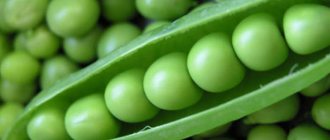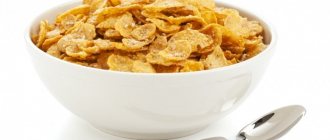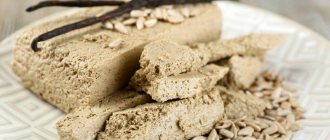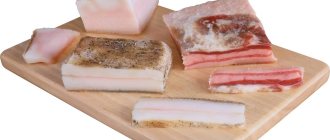A nursing mother knows that the consumption of exotic fruits while breastfeeding is strictly limited. Such fruits negatively affect the baby’s well-being and often cause an allergic reaction. The only exception is bananas.
In addition, fruits brought from distant exotic countries are chemically treated for long-term storage. Preservatives have a negative impact on the health of both the baby and the mother. They lead to severe poisoning!
However, doctors allow some fruits to be consumed 3-4 months after the birth of the child, when the baby’s body adapts to the new food. Pomegranate and pomegranate juice are among such fruits. However, this fruit and drink can only be consumed by a nursing mother with extreme caution and in compliance with certain rules.
Useful properties and composition
Pomegranate contains 15 rare and essential amino acids! Only meat contains such acids. The pulp of the fruit has special astringent properties that treat colitis and diarrhea. In addition, pomegranate is useful for nursing mothers because it restores hormonal imbalance, which is so important after childbirth.
Pomegranate and grant juice perform a number of beneficial properties in the body:
- Strengthens the immune system;
- Restores and improves skin;
- Resists hair loss and ensures rapid hair growth;
- Maintains visual acuity;
- Regenerates tissue;
- Eliminates diarrhea in a nursing mother;
- Relieves pain during menstruation;
- Normalizes metabolism;
- Stabilizes hormonal levels;
- Strengthens the heart and blood vessels;
- Helps with anemia;
- Lowers blood pressure;
- Extends life expectancy and slows down aging.
In addition to beneficial amino acids, the fruit contains essential vitamins and elements, each of which plays a vital role in the body of mother and baby.
| Vitamins and elements | Impact on the body | Contents per 100 g of product |
| Vitamin A (retinol) | Restores skin, improves condition and prevents hair loss, normalizes and preserves vision | 5 mcg |
| Vitamin B1 (thiamine) | Ensures normal metabolism, improves memory and attention, stimulates brain function | 0.4 mg |
| Vitamin B2 (riboflavin) | Relieves fatigue and anxiety, improves vision and reduces eye fatigue, ensures clean and elastic skin | 0.01 mg |
| Vitamin B5 (pantothenic acid) | Produces necessary energy, increases life expectancy, ensures normal growth and helps with dermatitis | 0.5 mg |
| Vitamin B6 (pyridoxine) | Normalizes the functioning of nerve cells, activates brain activity, improves skin condition | 0.5 mg |
| Vitamin B9 (folic acid) | Keeps the body in working order and improves emotional state, improves immunity | 18 mcg |
| Vitamin C (ascorbic acid) | Forms and strengthens the immune system, helps with stress and colds, improves mood and appetite, gives vigor and strength | 4 mg |
| Vitamin E (tocopherol) | Slows down aging and normalizes hormonal levels, improves blood composition and strengthens blood vessels, increases tone | 0.4 mg |
| Vitamin PP (niacin, nicotinic acid) | Improves memory, has a positive effect on digestion and heart function, helps with stress and insomnia, restores sleep, ensures normal blood circulation | 0.5 mg |
| Calcium | Strengthens the nail structure and bone skeleton, normalizes and regulates blood pressure, ensures normal blood clotting | 10 mg |
| Potassium | Regulates water balance, normalizes heart rate, improves brain function, ensures the functioning of muscles and tissues | 150 mg |
| Sodium | Prevents seizures, promotes healthy heart and brain function, and is good for teeth | 2 mg |
| Magnesium | Strengthens bones, regulates the functioning of the heart and blood vessels, helps with headaches and menstrual pain | 2 mg |
| Iron | Supplies oxygen to tissues, ensures energy metabolism, cell growth and normal digestion. | 1 mg |
| Phosphorus | Provides growth and strengthens teeth and bones, stabilizes kidney function, improves memory and brain function | 8 mg |
The dangers of eating pomegranate
The danger of eating pomegranate during lactation lies in the intense red color of the fruit. Brightness indicates the content of a strong allergen. As a result, the baby develops a rash, peeling and redness, cough and runny nose.
Pomegranate juice and pomegranate contain a lot of acid, which negatively affects the functioning of digestion and the stomach. An excess of this fruit in the body leads to bloating and pain, causing colic in a newborn baby. Therefore, pomegranate should not be consumed if you have stomach diseases or digestive problems.
Astringent properties have a strong effect on intestinal function and stool condition. Therefore, the fruit is contraindicated for mother and baby with constipation. But for diarrhea, pomegranate and pomegranate juice will provide effective help.
Recommendations for use
- Introduce pomegranate and pomegranate juice into your diet during lactation no earlier than three months after birth. The optimal age of the baby is 5-6 months;
- For the first test, eat one or two pomegranate seeds in the morning and observe the baby’s reaction for two days. If there are no negative consequences, you can safely eat pomegranate while breastfeeding;
- If you have stomach problems or allergies, it is too early to introduce fruit into your diet. You can try again at least a month after the first test;
- Gradually increase the dosage of consumed fruit by two times in relation to the previous portion;
- Start drinking pomegranate juice with 30 ml no more than once a week. Then gradually increase the portion to 150 ml per day;
- At first, dilute the juice by half with warm water, which will reduce the aggressive composition. Then gradually reduce the dose of water and switch to a full-fledged drink;
- Do not buy ready-made juice in bags or bottles, as they often contain many preservatives, dyes and chemicals. Drink only natural freshly squeezed juice.
Remember the main principle when breastfeeding is not to overeat. After all, even safe products, if abused, can cause a negative reaction in a baby. However, if you follow nutritional recommendations for a nursing mother, you can consume many foods without risk to lactation and the baby. For more information on what foods you can eat while breastfeeding, read the link https://vskormi.ru/mama/razreshennie-produkti-pri-grudnom-vskarmlivanii/.
The menu for a nursing mother is a serious matter. There is no single rule here. What suits one mother during lactation may give an unpredictable reaction when feeding another baby. According to scientists, as of 2020, 10-15% of newborns suffer from atopic dermatitis. The main reason is the incorrect menu of the nursing mother. It is well known that red fruits and berries are strong allergens. Is it possible to pomegranate while breastfeeding?
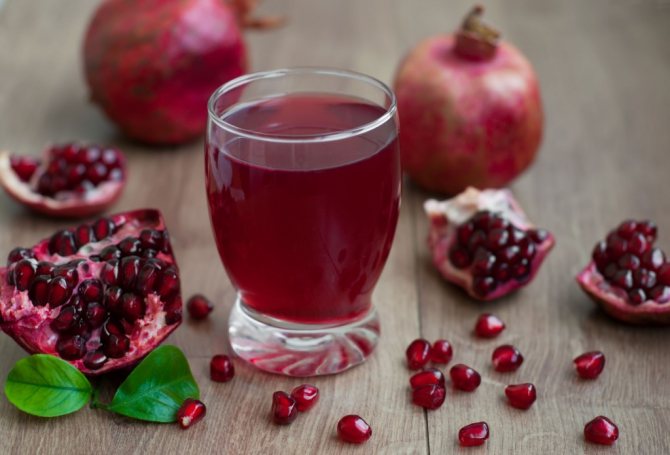
How to eat pomegranate for a nursing mother
A fruit such as pomegranate may well be included by a nursing mother in her diet, but with certain conditions. Doctors still recommend it to the list of fruits for nursing mothers. Pomegranates, apples, plums and pears are safe for breastfeeding.
When feeding, the fruits help increase the baby's immunity and maintain hemoglobin levels, provided they are consumed in moderation.
Experts recommend pomegranate during breastfeeding, adhering to the following rules:
- In the first month, colic and constipation may appear. For safe use, you should take no more than fifty grams;
- The gradual introduction of pomegranate seeds will diversify the mother’s diet and will accustom the baby’s intestines to new foods. At first, try no more than 10. Watch the baby. If there is no change, you can try increasing the number of beans;
- If mommy herself has any problems, it is better to stop eating pomegranate.
Also, you should not eat fruits that are beginning to rot and have an unripe appearance. When choosing a juicy fruit, focus on weight; it should be heavy. Ripe fruits are usually red, but the skin may also have a whitish tint. You should not take pomegranates that have spots, and to determine a good fruit by touch, you need to press a little on the skin. Dense grains mean you have chosen the right fruit.
You can find out what foods increase lactation in our article. Read here what fruits a nursing mother can eat.
Is it possible to eat oatmeal cookies while breastfeeding, read the link
Useful properties of pomegranate
Pomegranate and pomegranate juice are definitely healthy foods. What are their benefits for the body?
- Pomegranate is rich in potassium (100 g - 21% of the daily value). Without it, proper functioning of the cardiovascular and nervous systems is impossible. And in the first month after childbirth, a woman needs to remain calm, because a nervous state can affect the child.
- Using pomegranate you can boost your immunity. This fruit contains a large amount of vitamin C. During the feeding period, it is very important for the mother not to catch a cold.
- Pomegranate juice significantly improves digestion. A frequent problem with breastfeeding is considered to be a woman's bowel dysfunction. In the first month after childbirth, this problem is especially acute. If you drink juice, you can improve your condition.
- If a woman feels tired, weak, or nauseous during breastfeeding, then her hemoglobin level may have dropped. In order to raise it, it is recommended to drink pomegranate juice.
The benefits of pomegranate - truth or myth?
Most often you can hear that pomegranate juice raises hemoglobin, and brewed pomegranate peels help with diarrhea. Indeed, the pomegranate pericarp contains tannins and antibacterial substances that act on microbes that cause loose stools.
Some doctors recommend that nursing mothers use pomegranate peels for problems with stool, since many medications are prohibited during lactation, and an infusion of pomegranate peels alleviates the condition. Also, if pomegranate extract is included in medications, this is good, since it contains unique alkaloids that help cope with stomach and intestinal problems.
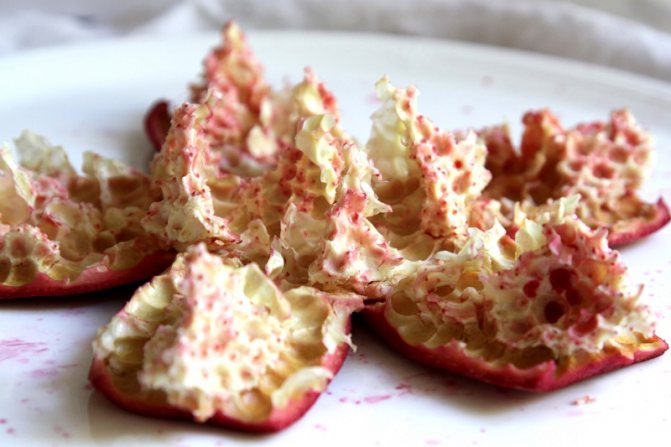
Is it possible to eat pomegranate while breastfeeding if the mother has low hemoglobin? First, you need to determine whether pomegranate juice is a rich source of iron. Let's consider products containing the largest amount of this element:
- Meat and offal.
- Halva.
- Dried mushrooms.
- Seafood.
- Wheat bran.
- Sea kale.
- Beet.
- Pomegranate.
You can see that the pomegranate is in the dishonorable 8th place. How so? The fact is that iron is better absorbed from animal products rather than plant products. Therefore, if the mother experiences chronic fatigue in the first month after childbirth (this is the first sign of anemia), it is recommended not to drink pomegranate juice, but to eat a little beef or offal every day.
What else do you need to know
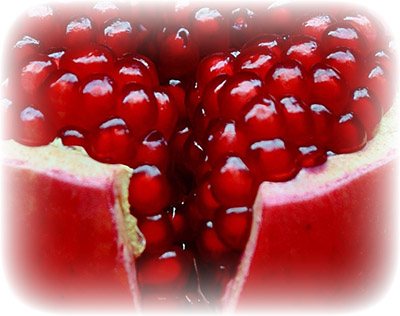
Let's answer the question: Is it possible to include liver in the diet of a nursing mother or not?
Contraindications
Pomegranate, like many exotic fruits, has contraindications:
- It is not recommended to drink pomegranate juice if you have diseases of the intestines and stomach, because it contains many acids that can aggravate the disease;
- freshly squeezed pomegranate juice has a destructive effect on tooth enamel;
- due to the content of tannins in pomegranate, it is contraindicated for constipation;
- This fruit is contraindicated for children under 1 year of age; from 1 to 7–10 years of age, pomegranate juice must be diluted by about half with water before drinking.
How pomegranate can harm you while breastfeeding
What basic commandments must be observed when choosing a diet for a nursing mother? This:
- moderation;
- gradual introduction of new products to the menu;
- carefully monitoring the child’s reaction to a new product;
- preferential consumption of locally grown vegetables and fruits
In most regions of Russia, pomegranate does not grow and is not a “local” product. Therefore, its use must be approached gradually and carefully, despite its usefulness. According to the observation of doctors, fruits and vegetables of red shades are more allergenic. The garnet is distinguished by its red color. Its careless use during breastfeeding can cause:
- allergic reactions in the baby;
- indigestion - constipation or, conversely, diarrhea;
- if the mother has problems with the stomach or intestines, the acids contained in pomegranate can provoke an exacerbation of the disease;
- pomegranate fruit acids negatively affect tooth enamel. During pregnancy, teeth were already at sufficient risk of destruction due to the fact that calcium from the mother’s body was required for the development of the child’s skeleton. Therefore, it is better to drink pomegranate juice through a straw. This measure will protect teeth from decay
Doctors' recommendations
Domestic pediatricians insist that mothers, when breastfeeding their children, be guided by the golden rule: “Eat only local and seasonal fruits and vegetables.”
For most of Russia, pomegranate is an imported delicacy. There is also a high probability of an allergy in the child, since everything consumed by the mother is reflected in the milk in one way or another.
There is an opinion that there are no food restrictions for a nursing mother; the main thing is to introduce all foods gradually and watch the baby’s reaction. But there is such a thing as cumulative allergies. If you drink pomegranate juice every day for a week, the reaction may take some time to appear. Also, breast milk may taste sour, and the baby may refuse to eat. This is especially important to consider in the first months after childbirth.
Tips for consuming pomegranate and pomegranate juice:
- Mothers during lactation can eat pomegranate and drink juice when the baby reaches six months. It is recommended to introduce a new product gradually.
- A child can be offered to drink pomegranate juice for the first time after one year, diluting it with water 50/50.
- Pomegranate seeds are not recommended for consumption.
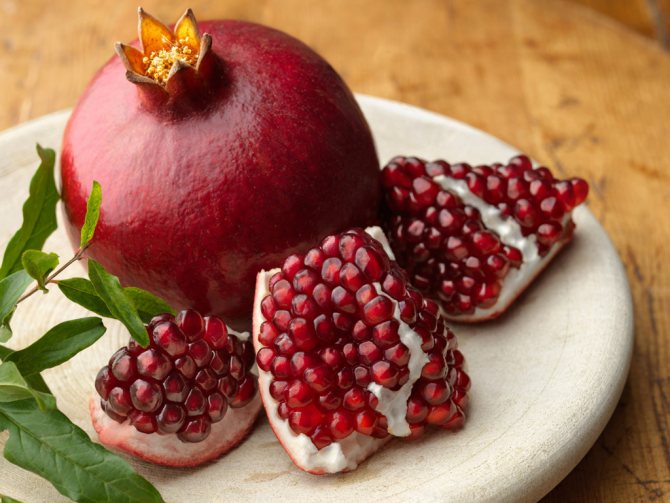
How to introduce pomegranate into your diet
Incorrect or excessive consumption of pomegranate and pomegranate juice, with all its positive properties, can cause harm not only to the child, but also to the nursing mother. Follow a few simple rules, and this wonderful product will only benefit you and your baby.
- Pomegranate during breastfeeding can provoke allergic reactions, which is typical for most brightly colored vegetables and fruits. Introduce it into your diet gradually, starting with a few grains. It is better to eat pomegranate in the morning, this will make it easier for you to monitor your child’s well-being. Wait a couple of days, if the child has no stomach problems or skin rashes, you can continue to eat pomegranate, gradually increasing the portion.
- The pomegranate season lasts quite a long time. It ripens in early autumn and lasts until February. At other times of the year, pomegranate is not recommended for nursing mothers, since there is a high risk that the product has been lying on the counter for a long time or has undergone long-term transportation, which will not have a very good effect on its beneficial properties. In the summer, you can treat yourself to pomegranate juice; its taste is just as pleasant, and its benefits are beyond doubt.
- Fruit acid contained in pomegranate and its juice in large quantities can worsen the condition of people suffering from stomach diseases.
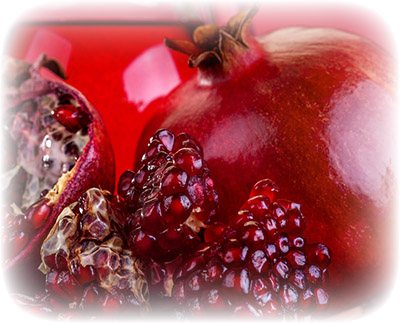
Let's explore the question: Useful assistant: dried fruit compote for breastfeeding
How to choose pomegranate and pomegranate juice?
If a nursing mother decides to eat a pomegranate, then it is very important to choose it correctly. You can use the following recommendations:
- Carefully examine the pomegranate peel: it should be bright and dark. There should be no cracks or damage on it. If a pomegranate has spots, it means the fruit is overripe and possibly rotten;
- Take a pomegranate in your hand. Compare several pomegranates; the ripe fruit should be heavier than the rest;
- Tap the pomegranate; the ripe fruit sounds “metallic”;
- The area of the pomegranate flower should be dry, not green.
It is better to drink pomegranate juice freshly squeezed. If this is not possible, then when buying in a store, you should follow the rules:
- High-quality pomegranate juice is sold in glass bottles.
- The bottle cap must be protected: to open it, you need to cut the protection with a knife.
- The label is clearly printed. There should be enough information on it: contents, vitamins, production date, shelf life.
- The pomegranate juice itself is dark burgundy in color.
- The production time is important: pomegranates ripen from September to November.
Choosing pomegranate juice
If it is not possible to make pomegranate juice with your own hands, then you need to know how to choose a good quality product in the store. Pay attention to the following indicators:
- Price. Real pomegranate juice cannot cost less than 100 rubles. per liter of drink.
- Information on the label. The manufacturer, dates of production and bottling, and expiration date must be indicated. The label itself looks high quality. The production date corresponds to the summer or autumn period, depending on when the pomegranates are harvested.
- Compound. High-quality juice does not contain chemical additives - dyes, preservatives and others. Sugar in the composition is also undesirable.
- Package. Preference should be given to juices in glass containers so that you can evaluate the transparency and color of the contents. There should be no impurities in the liquid, it itself is transparent, ruby or burgundy in color, the bottle cap is “sealed” with a protective film.
- Name. Pomegranate juice is exactly the name of the product, without quotation marks or postscripts, or the use of the word “nectar”.
When choosing pomegranate juice, give preference to drinks in glass containers.
A nursing mother knows that the consumption of exotic fruits while breastfeeding is strictly limited. Such fruits negatively affect the baby’s well-being and often cause an allergic reaction. The only exception is bananas.
In addition, fruits brought from distant exotic countries are chemically treated for long-term storage. Preservatives have a negative impact on the health of both the baby and the mother. They lead to severe poisoning!
However, doctors allow some fruits to be consumed 3-4 months after the birth of the child, when the baby’s body adapts to the new food. Pomegranate and pomegranate juice are among such fruits. However, this fruit and drink can only be consumed by a nursing mother with extreme caution and in compliance with certain rules.
How to cook pomegranate?
If you are tired of just eating pomegranate, then you can prepare delicious dishes with it: salads, sauces, roasts. This fruit goes best with chicken: it gives it a beautiful color and sourness.
Chefs are confident that pomegranate sauce is one of the best seasonings for meat. It is a thick pomegranate juice with spices, which is cooked like jam. Pomegranate will also serve you to add beauty to the salad: you need to lay out the pomegranate kernels over the entire surface of the appetizer.
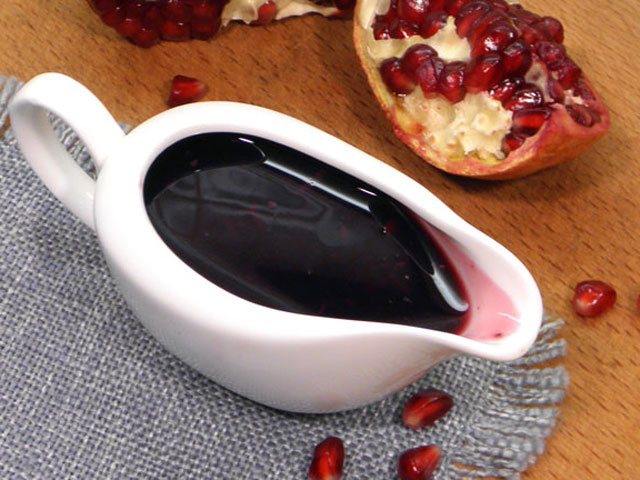
Can a nursing mother eat pomegranate?
Each mother decides for herself what is good for her baby. A woman during lactation needs to be especially responsible about her diet in the first months after childbirth, since the gastrointestinal tract of a newborn is just developing, and each new product can give an unpredictable reaction.
- During breastfeeding, it is recommended to include pomegranate in the mother’s menu, starting from the sixth month of the child’s life;
- as an independent meal, pomegranates can be offered to a grown-up baby after one year;
- Before drinking, it is advisable to dilute pomegranate juice with water 50/50.
A nursing mother should draw up a menu with all seriousness and responsibility towards the child. Any product consumed by a woman passes through breast milk to the baby. As you know, red fruits or vegetables are strong allergens, so during pregnancy, lactation or if the body is hypersensitive, they should be excluded. Young mothers are wondering whether it is possible to eat pomegranate while breastfeeding.
Can I drink pomegranate juice?
Pomegranate juice is recommended to be introduced into the diet of a nursing woman from the fourth month of a child’s life. The content of organic acids in the juice is higher than in the pulp. An increase in the concentration of substances occurs due to a decrease in the amount of dietary fiber after squeezing. Considering this circumstance, it is safer to drink the juice after diluting it with water in a 1:1 ratio. The daily intake of undiluted juice during breastfeeding is about 30 ml. It is necessary to add pomegranate juice to your diet with extreme caution, following the same rules for the safe introduction of the product as when consuming the pulp of the grains. Nursing mothers are advised to carefully choose a quality product.
Composition and beneficial properties of pomegranate
This fruit contains potassium, which normalizes the functioning of the heart, blood vessels and nervous system. The benefits of pomegranate or juice prepared from it are enormous:
- A high concentration of ascorbic acid provides general strengthening properties for the body’s immune system, vitamin A normalizes the condition of the skin and hair.
- B vitamins improve the body's metabolic processes, reduce nervousness (help with stress), fatigue, and activate brain function. The composition contains calcium, sodium, phosphorus, magnesium.
- Eating this fruit helps the digestive system cope with its function due to its fiber content. Coarse fibers remove toxins and unnecessary substances from the body.
- Amino acids help normalize hormone levels after childbirth. Pomegranate juice in moderate quantities improves intestinal function and increases hemoglobin.
- The pomegranate pericarp and peel contain tannin and antibacterial substances that help cope with diarrhea.
- Vitamin PP improves the functioning of the heart, digestive tract, and normalizes the emotional background.
Harm of pomegranate during breastfeeding
Eating pomegranate increases the risk of allergies and colic in your baby. Despite the beneficial properties of the juice, its intake should be limited to the first year of the child’s life. A nursing mother must follow all the pediatrician's recommendations, especially if the child is allergic. It is necessary to remember the toxic properties, the amount of preservative and the accumulated harmful substances in the skin of the fruit. A negative reaction appears immediately.
Pomegranate has contraindications for breastfeeding:
- Diseases of the stomach and intestines, high stomach acidity. Due to the high content of ascorbic acid, pomegranate is not recommended for consumption by people suffering from gastrointestinal diseases.
- Thin tooth enamel. Freshly squeezed juice destroys enamel.
- Individual intolerance to active substances.
- Delayed bowel movement. The fruit contains tannin tannins, which will aggravate constipation.
This fruit is contraindicated for children under one year old. The juice is consumed diluted from 1-10 years. After use, it is necessary to monitor the body's reaction.
The use of pomegranate during breastfeeding should be delayed until at least 11 months of age.
Rules for consuming pomegranate juice
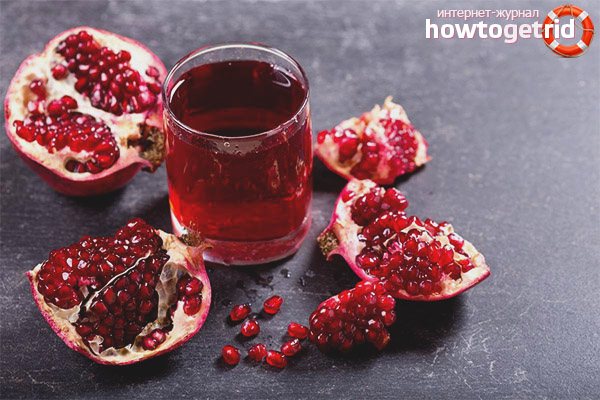
- Like most different products, fresh pomegranate can be perceived in different ways. Everything will depend only on the individual characteristics of the human body. Therefore, introduce the juice gradually. Closely monitor any changes in your baby's health.
- Do not try to start taking packaged juice while breastfeeding. Such products contain a large number of preservatives and harmful substances. There is simply nothing healthy or natural in such a drink. Drink only real fresh juice, diluted with warm water.
- Don't be fooled by beautiful labels from well-known manufacturers. The composition of this juice is described as incredibly healthy. It is important to understand that the vitamin complex is introduced after preparing the drink. During pasteurization, all beneficial enzymes are destroyed.
- This juice can only quench your thirst, nothing more. Start drinking fresh juice with small portions. Pomegranate is a red fruit; the child may be sensitive to natural components. Possible rashes, itching and redness. Be extremely careful.
- Also, do not forget to consider possible contraindications. It is not recommended to include juice in the diet for peptic ulcers of any type. Also, you should not drink fresh juice if you have high stomach acidity, gastritis, weak tooth enamel and frequent constipation. Remember that drinking juice in its pure form is prohibited. Dilute it with water.
If you decide to eat pomegranate while breastfeeding, introduce the product into your diet with extreme caution. Monitor the reaction of your own body and your baby. In case of any deviations, immediately stop taking the fresh juice. If necessary, consult your doctor.
Is it possible for a nursing mother to have pineapple?
Introducing pomegranate into the diet during lactation
Due to the high allergic reaction of the fruit, it is recommended to conduct a sensitivity test before eating pomegranate while breastfeeding. For example, a mother eats 4-5 grains and watches her baby for two days. If no rash appears on the skin during the day, and there is no redness, you can add 10 more grains. If the structure and color of stool changes, the fruit should be discarded.
When breastfeeding, pomegranates can be eaten no more than 1⁄4 parts. The daily norm is 50 g.
Many people are interested in whether pomegranate juice can be consumed while breastfeeding. The first months after the birth of the baby, the mother must follow a strict diet. You cannot introduce new foods into your diet, especially red and orange ones. It is advisable to dilute the juice with water.
You cannot introduce several new products at once, and if reactions occur, the fruit is canceled. Natural juice should be drunk through a straw to avoid destruction of tooth enamel.
How to properly consume pomegranate during lactation?
During the war, it is allowed to use pomegranate, but subject to certain conditions. This fruit is considered a strong allergen; it is advisable to consult a pediatrician before consumption to eliminate possible risks.
How to introduce pomegranate into the menu of a nursing mother
If your baby has any manifestations of allergies, you should stop eating pomegranate.
A woman should understand that pomegranate should be consumed with caution. If you follow certain rules, you can minimize the risks.
Tips for eating pomegranate:
- You can introduce pomegranate or its juice into your diet 3-4 months after birth;
- At first, you can eat a couple of grains, monitoring the baby’s reaction. If the baby reacts normally, you can subsequently increase the dose. Pomegranate juice should be tasted with 30 ml, gradually increasing to 150 ml;
- First, the juice should be diluted with warm boiled water 1:1. This will reduce the acidity of the juice;
- You should not buy juice in stores, as store-bought ones contain many preservatives. It is better to drink freshly squeezed juice;
- If allergies, gastrointestinal problems, or constipation occur in a child, you should stop consuming pomegranate, as well as products made from it. You can try again in a month.
In what form is it better to eat pomegranate?
According to the recommendations of experts, a nursing woman is responsible for the health of the child, which means that her nutrition should be at the highest level of safety. It is advisable to consume local fruits and vegetables. Many people believe that new foods should be introduced to a young mother in small quantities, gradually. However, there is such a thing as accumulated allergies. The body's response may not appear immediately, but after a week. Milk may change the taste to sour. Therefore, the choice of form of use depends on personal preferences. When drinking juice, it should not be mixed with honey or sugar. Some substances deactivate all the necessary vitamins in the drink. It is preferable for the mother to squeeze the pomegranate juice herself.



